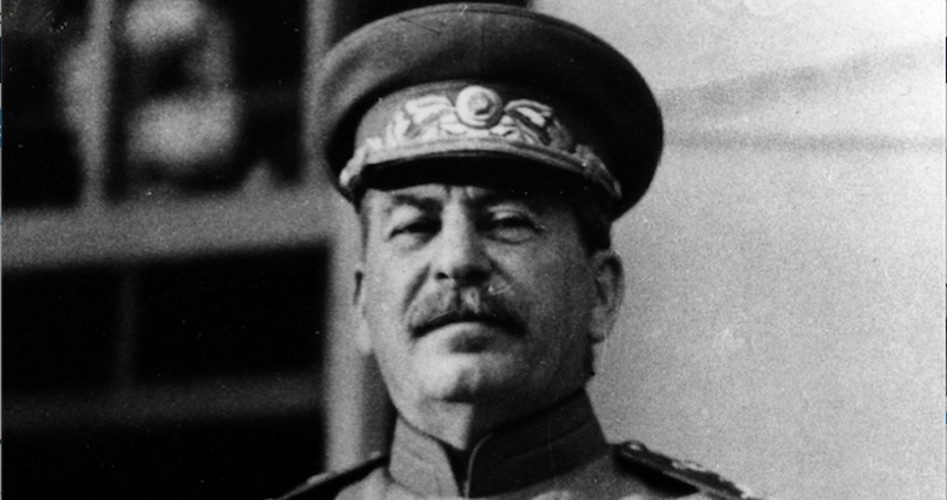
Yuri Dmitriev is facing trial in Russia on charges of involving his adopted daughter, then 11, in child pornography, illegally possessing the “main elements of” a firearm, and depravity involving a minor. But many believe the real reason for the charges, which the 61-year-old historian denies, is because of his unearthing a mass grave with up to 9,000 bodies, linked to Joseph Stalin’s Great Terror of the 1930s.
Russia is no longer a communist nation, officially, and Russian President Vladimir Putin has publicly criticized the “excessive demonization of Stalin,” because he believes this unfortunate past is used by foreigners to undermine the country. However, Putin has also used the country’s victory in World War II, when Stalin (shown) was the country’s communist dictator, as a way to appeal to Russian patriotism, before the upcoming March presidential election.
Dmitriev’s discovery brings up the inglorious elements of the Stalin Era, with its state-sanctioned killing of millions of people. If he is convicted of the charges, he faces up to 15 years in prison.
The legal case against Dmitriev, on the surface, appears quite weak. He has previously been judged of sound mind by a court-approved group of experts, who found no pornographic content in nine photographs of his daughter, which prosecutors are alleging makes the case against him. Despite this, a court ordered the nine photos be reexamined by more experts for a third time, and further directed that Dmitriev be subjected to more psychiatric testing to determine is he has “sexual deviations.”
The irony in Dmitriev’s present legal difficulties is that charges of mental illness were routinely made against dissidents during the Stalin Era, because, after all, opposition to communism must be a “mental illness.” Viktor Anufriev, Dmitriev’s attorney, noted the irony, “Perhaps if they can’t convict him (of child pornography) they need to declare him insane. It’s a purely Soviet procedure. Make accusations and then end things by locking someone up in a psychiatric facility.”
While charges of mental illness have not been widely used to silence political opposition in the United States, as was done in Stalinist Russia, reckless accusations of mental illness in political struggles have been made. Examples include the infamous charges by left-wing psychiatrists against Senator Barry Goldwater in 1964, and recent irresponsible accusations leveled against President Donald Trump.
Viktor Anufriev, Dmitriev’s attorney, told Reuters on Tuesday of this week that he had asked the supreme court in Karelia, the region where his client will be tried, to overturn the court order.
“He’s already been through one (psychiatric) test,” Anufriev said. “The conclusions were fine, no evidence of deviance was found, and the results were not contested by prosecutors. This (latest testing) was ordered illegally.”
Putin expressed his displeasure at the “excessive demonization” of Soviet dictator Joseph Stalin to American filmmaker Oliver Stone as “one means of attacking the Soviet Union and Russia.” Putin’s complaint was that the critics use Stalin’s murderous legacy “to show that today’s Russia carries on itself some kind of birthmarks of Stalinism.” By which, they no doubt, he knows, are making unflattering allusions to Putin himself. While it is a stretch to compare Putin to Stalin, some conservatives in America make the opposite mistake of making him some sort of paleoconservative.
“We all have birthmarks of some kind — well, so what? Russia has changed fundamentally,” Putin said, arguing that the modern Russia (under Putin) should not be held responsible for the Stalin Era.
Stalin ruled the Soviet Union from the time he won the power struggle with Leon Trotsky to succeed dictator Vladimir Lenin in the mid-1920s, until his death in 1953. He is held to be responsible for as many as 30 million Russian deaths through executions, labor camps, and avoidable famines.
Despite all of that, Putin praised Stalin as an “effective manager.” Putin is not alone in Russia in believing that Stalin had some good qualities. An April poll by the Levada research center found that one-fourth of Russians actually consider Stalin’s actions “historically justified.” Amazingly, another 13 percent admitted they knew “nothing” about Stalin’s mass murders. Sadly, there are many Americans who are much harsher in their criticisms of a man who fought against Stalinist infiltration of the U.S. government — Joseph McCarthy — than they ever were of Joseph Stalin.
Putin himself was a lieutenant colonel in the KGB before entering politics in Saint Petersburg in 1991. In 1999, he denounced communism as “a blind alley, far away from the mainstream of civilization.”
Photo of Stalin: AP Images


